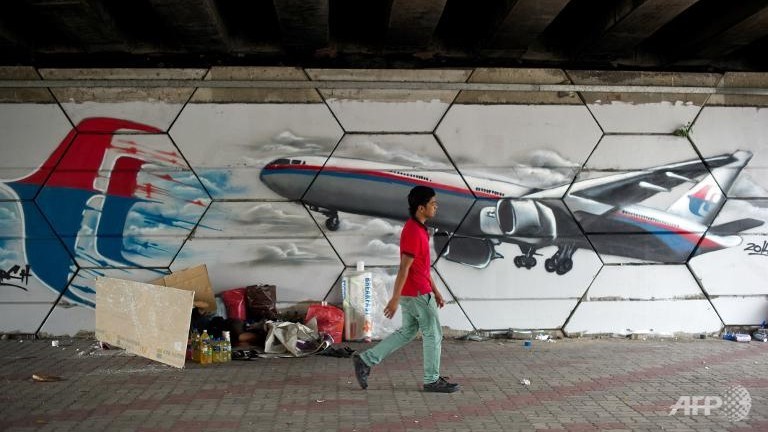Aircraft tracking changes considered after MH370 mystery

A man walks past graffiti featuring the missing Malaysia Airlines flight MH370 displayed on a wall in Ampang, in the suburbs of Kuala Lumpur. (AFP/Mohd Rasfan)
MONTREAL: Tracking aircraft by satellite, cloud storage of black box data and other technological innovations are being considered by aviation officials in the wake of Malaysia Airlines flight MH370's disappearance.
The fate of MH370 has become one of the greatest mysteries in aviation history since it vanished on March 8 during a flight from Kuala Lumpur to Beijing with 239 people on board.
Despite a massive international search in the Indian Ocean, no trace of the missing Boeing 777 has been found.
The International Civil Aviation Organization (ICAO) is holding a special meeting on Monday and Tuesday in Montreal to discuss how to prevent a recurrence of this tragedy as well as the mystery that surrounds it.
"Meeting participants will explore the use of existing technologies that may provide the means to support globally track airline flights at a reasonable cost," said a statement.
These technologies could allow, for example, basic data such as an aircraft's position, altitude, speed and course recorded and transmitted via satellite in the event of a sudden change, said the ICAO.
French authorities had already lobbied the ICAO to adopt the new standards following the June 2009 crash of an Air France flight from Rio de Janeiro to Paris that killed 228.
The jetliner's black box was not recovered from the bottom of the Atlantic Ocean until 2011, after an exhaustive search of a zone not covered by ground radar.
"For the general public, it has become unthinkable that a flight can simply disappear," says a European Union discussion paper posted on the ICAO website.
"An aircraft should be permanently tracked, even beyond radar coverage and in case of an accident, it should be immediately located."
Ahead of the two-day meeting, the ICAO asked industry groups for a complete list of technologies that might be useful to the airline sector.
Twenty-two companies, including Globalstar and Rockwell Collins, responded to the call.
"The responses received so far to the ICAO questionnaire showed that there are existing commercial off-the-shelf solutions providing global coverage for hardware costs under USD $100,000," said the ICAO.
British satellite operator Inmarsat has also offered a basic tracking service to all of the world's passenger airlines free of charge.
Inmarsat, which has played a role in the search for the missing plane, said the service would allow a plane to determine its location using GPS and send that data over Inmarsat's global network at 15-minute intervals.
While GPS (Global Positioning System) is commonplace in cars and mobile phones, the international air traffic control network is still almost entirely based on radar.
In the so far fruitless search for the Malaysian jet, electronic pings from Inmarsat equipment on the lost plane led investigators to search for wreckage in the Indian Ocean.
Inmarsat said it would also offer a "black box in the sky" service under which a plane that had deviated off course -- which is believed to be the case with flight MH370 -- could transmit historic and real-time information from the flight data recorder and cockpit voice recorder.
The ICAO meeting is expected to lead to a working group that should present its recommendations within five months.
What the stars mean:
★ Poor ★ ★ Promising ★★★ Good ★★★★ Very good ★★★★★ Exceptional
Latest News
More News
- Russian President congratulates Vietnamese Party leader during phone talks (January 25, 2026 | 09:58)
- Worldwide congratulations underscore confidence in Vietnam’s 14th Party Congress (January 23, 2026 | 09:02)
- Political parties, organisations, int’l friends send congratulations to 14th National Party Congress (January 22, 2026 | 09:33)
- 14th National Party Congress: Japanese media highlight Vietnam’s growth targets (January 21, 2026 | 09:46)
- 14th National Party Congress: Driving force for Vietnam to continue renewal, innovation, breakthroughs (January 21, 2026 | 09:42)
- Vietnam remains spiritual support for progressive forces: Colombian party leader (January 21, 2026 | 08:00)
- Int'l media provides large coverage of 14th National Party Congress's first working day (January 20, 2026 | 09:09)
- Vietnamese firms win top honours at ASEAN Digital Awards (January 16, 2026 | 16:45)
- ASEAN Digital Ministers' Meeting opens in Hanoi (January 15, 2026 | 15:33)
- ASEAN economies move up the global chip value chain (December 09, 2025 | 13:32)
















 Mobile Version
Mobile Version